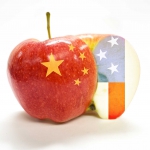CNBC says China slapping a tariff on U.S. agriculture goods, including apples and cherries, puts a damper on sales of those commodities and could open a door to Australia and other producers.

(TJ Mullinax/Good Fruit Grower photo illustration)
China announced plans to put a tariff of up to 25 percent on U.S. good in retaliation to President Trump putting tariffs on Chinese steel and aluminum. A 15 percent tariff would fall on apples and cherries. U.S. wine makers were among those worried about losing sales.
On Wednesday, some Trump administration officials were signaling hope for a negotiated settlement, but Trump himself sounded bellicose: “When you’re already $500 Billion DOWN, you can’t lose!” the president wrote, in reference to the 2016 U.S. deficit in goods and services trade.
The New York Times reported that Chinese leaders are confidant they would win a trade war. Chinese leader Xi Jinping:
His authoritarian grip on the news media and the party means there is little room for criticism of his policies, even as Mr. Trump must contend with complaints from American companies and consumers before important midterm elections in November.
The Chinese government also has much greater control over the economy, allowing it to shield the public from job cuts or factory closings by ordering banks to support industries suffering from American tariffs. It can spread the pain of a trade war while tolerating years of losses from state-run companies that dominate major sectors of the economy.
Trump intensified the dispute late this week by threatening to increase tariffs on Chinese goods by another $100 billion.
China’s tariff hit of up to 25 percent for U.S. agriculture could be a big gain potentially for Australia, particularly for wine and certain nut and fruit producers.
“We’ve invested quite a lot of time and money in building the market in China for 15 years, and then this may force us to reduce the amount of wine we’re going to sell there just because our wines will become less economically viable,” said David Amadia, president of Ridge Vineyards in the Santa Cruz Mountains of California.
For the last five years, Ridge Vineyards has enjoyed “consistent growth” in the Chinese market even as it competes with premium French and Italian wines as well as Australian wines. But he said the new 15 percent Chinese tariff likely means “it will sort of be a lost investment.”
China’s finance ministry announced in a statement published Sunday it would impose retaliatory tariffs on up to 128 kinds of U.S. goods, following through on a threat initially made March 23 by Beijing that it would target $3 billion worth of American imports…..
However, the U.S. could lose market share on fruit, nuts and wine to Australia. Almost 40 percent of Australia’s fruit exports last year went to China and Hong Kong, according to the Australian Bureau of Statistics. Also, Chile, New Zealand and South Africa also have been getting in on the action.
The Yakima Herald reported that, with the cherry harvest a few months away and the apple harvest even later, there is time for negotiations that may end the dispute.
The impact of Chinese tariffs on cherries and apples, which have a
But agricultural officials didn’t spend much time during Cantwell’s visit wringing their hands over China’s announcement, namely due to the timing. There are still a few more months until the start of the cherry harvest and even more time until the apple harvest in the fall.
“If there’s a silver lining, it’s that there is a little bit of a cushion for the U.S. and China to come up with a resolution,” said Kate Woods, vice president of the Northwest Horticultural Council, a Yakima-based organization that handles policy issues, including trade, for the region’s treefruit industry.






Leave A Comment